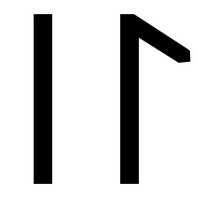
Viking Names
Spillir
Spillir is a relatively rare male name which is found as the first element in the place-name Spilsby, Lincolnshire. The name possibly derives from the Old Norse word spillir ‘spoiler, breaker’.
Read More
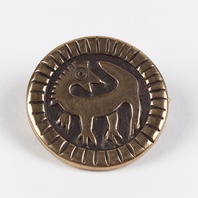
Viking Objects
Reproduction Brooch with Backwards-Facing Beast
A reproduction of a copper alloy disc brooch featuring a backwards-facing beast motif. This style of brooch would have been an everyday item rather than a high status one. For more information on Scandinavian jewellery in England check out our blog: Brooches, Pendants and Pins: Scandinavian Dress Accessories in England.
Read More
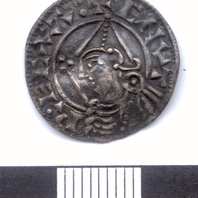
Viking Objects
Coin of Cnut the Great (NARC-9AE391)
This silver Helmet IIIc Type penny was minted for King Cnut of England by the moneyer Eadwine in Thetford. The obverse displays + CNUT RECXA with a figure wearing a pointed helmet. The reverse displays + EDPINE ON DEOD and a voided short cross. Minting coins was a way of controlling the means of exchange within a kingdom and which created a more easily administered standardized system of trade. Moreover, the coins themselves were often used as propaganda, portaying symbols and statements that gave off a desired message. The Vikings later used the minting of coins to legitimize their own rule.
Read More
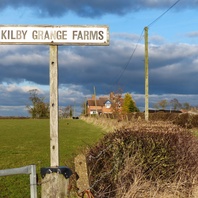
Viking Names
Kilby
Kilby, in the Guthlaxton Hundred of Leicestershire, was probably an Old English compound from Old English cild (cilda genitive plural) ‘a child, a young person, a boy, a son (usually implying noble birth)’ and Old English tun ‘an enclosure; a farmstead; a village; an estate’. The place-name underwent Scandinavianization with the generic tun being replaced with Old Norse by ‘a farmstead, a village’ and the use of an initial Old Norse k for the Old English initial ch.
Read More
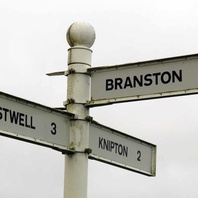
Viking Names
Knipton
Knipton, in the Framland Hundred of Leicestershire, is a Anglo-Scandinavian hybrid from Old Norse gnípa ‘a steep rock or peak’ and Old English tun ‘an enclosure; a farmstead; a village; an estate’. The name is topographically appropriate as the village lies in a narrow valley with hills rising steeply on each side. Pagan Anglian burials here suggest an earlier Old English place-name that was replaced with Scandinavian settlement.
Read More
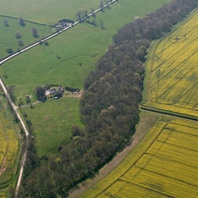
Viking Names
Beesby
Beesby, in the Bradley Haverstoe Wapentake of Lincolnshire, comes from a male personal name Besi and the Old Norse element by ‘a farmstead, a village’. The name Besi, which is recorded for Lincolnshire in Domesday Book, seems to be a Danelaw version of a Scandinavian name recorded in Old Danish as Bøsi. Today the name survives only in Beesby Farm and Beesby Hall, but remains of a deserted medieval village can be seen.
Read More
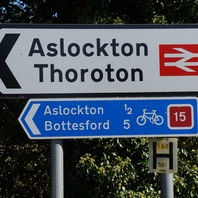
Viking Names
Thoroton
Thoroton, in the Bingham Wapentake of Nottinghamshire, comes from the Old Norse male personal name Þurferð and the Old English element tun ‘farm, settlement’. It is thus a hybrid name, like others nearby, such as Aslockton and Colston Bassett. The Thoroton Society, Nottinghamshire’s principal historical and archaeological society, takes its name from Dr Robert Thoroton who, in 1677, published the first history of the county. He in turn (or rather one of his ancestors) presumably took his name from the village.
Read More
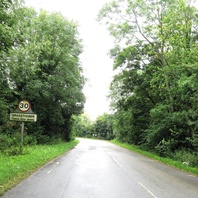
Viking Names
Grassthorpe
Grassthorpe in the Thurgarton Wapentake of Nottinghamshire is an Old Norse compound from gres ‘grass’ (which could also be Old English) and þorp ‘a secondary settlement, a dependent outlying farmstead or hamlet’.
Read More
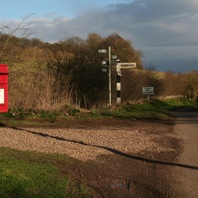
Viking Names
Skendleby
Skendleby, in the South Riding of Lindsey of Lincolnshire, is a name of uncertain origin. The first element is obscure, but is perhaps scenehelde ‘beautiful slope’ from Old English scene ‘bright, beautiful’ and helde ‘slope’. The second element of the place-name is Old Norse by ‘a farmstead, a village’.
Read More
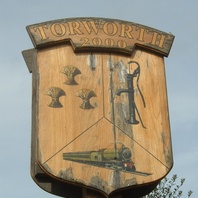
Viking Names
Torworth
Torworth, in the Bassetlaw Wapentake of Nottinghamshire, comes from the Old Norse male personal name Þórðr and the Old English element worð ‘enclosure’.
